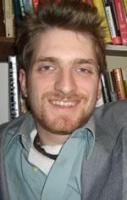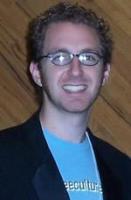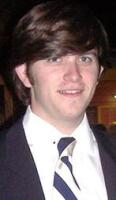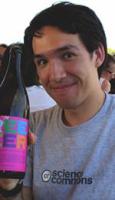A new generation of activists is making its presence known in the scholarly communication community. These students — undergraduates, graduates, and some who have recently left academe — are influencing university policy, organizing conferences on free culture, creating new avenues for students and faculty to publish under liberal licenses, and vocalizing their commitment to things open on campus, in the media, and all over the Web. As they enter the workforce, these students’ drive to revitalize scholarly communication will continue to impact academic institutions as well as industry. While these Agents of Change grow in number each semester, here five of them are recognized as SPARC Innovators.
I. Benjamin Mako Hill, 26, Cambridge, MA “The Technologist”

Benjamin Mako Hill
As a programmer and an academic, Hill has a deep understanding of how to create open access-friendly literature and of the benefits that this literature can bring to the world of scholarly and scientific communication. Most importantly, though, he just gets it. Those in the “post-Napster computer generation know just how silly it is to try and create market scarcity on the net,” he says. “For something as important as basic research and scientific knowledge, [lack of access] becomes profoundly unfair. This is the OA argument at its simplest and it resonates with young people.”
Hill knows what resonates because he’s been proselytizing at his alma mater, MIT, for years. He graduated from the MIT Media Lab and is currently a Researcher at the Sloan School of Management at MIT and a Fellow in the MIT Center for Future Civic Media. His undergraduate years as a programmer, during which he was introduced to the free and open source software movement, first stirred his activism. “Since I’ve seen the power of openness and freedom to creative work in software, the closed proprietary academic publishing industry seems unjust, unnatural, and inefficient,” he says. “For me [open access] is the only model that seems to make any sense at all.”
To demonstrate to his peers the unattractive alternative to open access, Hill organized a project called “Overprice Tags” at MIT (http://mako.cc/fun/overpricetags/). Inspired by a similar program at Brown nearly a decade ago, MIT students printed labels for the most expensive journals that MIT subscribes to and then placed them on the front of the journals on the reading racks in the MIT libraries. “People were truly shocked to find out that the journals at MIT can cost over $20,000 a year,” he remembers. “The prices are hidden to most students and most resources and simply making the scale of these costs visible is sobering, and often an angering experience.”
For undergraduates, he believes, a discussion centered on the cost issue has the most impact because many undergrads are going into debt to continue their education. Knowing that their institution is pumping millions into the coffers of “profiteering publishers on the winning side of unfair rights deals” can gain support among this younger group.
Hill cites the Public Library of Science (PLoS) as a beacon to the first generation of academics – such as himself – who have grown up with open access publishing. PLoS “opens the door to principled work without compromising on the formal ways that graduate students and young or aspiring professors are evaluated,” he says. “Young academics need ways to publish and advance their careers without compromising on their principles.” With PLoS – and other initiatives that will certainly be launched by this emerging generation of activists – such compromises may one day be a thing of the past.
II. Gavin Baker, 21, Longwood, FL “The Professional”

Gavin Baker
Gavin Baker remembers the chaos that ensued when he discovered that the last-minute research he needed for important undergraduate papers was inaccessible to him. Even worse was when his undergraduate institution, the University of Florida, announced that it might have to eliminate some subscriptions due to budgetary constraints. “I saw how the subscription model is failing the academy,” he remembers.
But he wasn’t content to grumble. He has a long-term interest in science and technology policy, and had for years followed the efforts of the organization “Students for Free Culture” as it worked to influence local and national information policies. Baker decided it was time to add his voice to the mix. So in February 2005 he co-founded Florida Free Culture, and the next year he won a student senate seat, running a campaign with open access at the heart of his platform. The next month, he published an op-ed in the University of Florida newspaper advocating for open access and, that spring, he organized a panel discussion at the university on open access.
Baker also worked to raise awareness of national access policies. He promoted the proposed 2006 Federal Research Public Access Act (FRPAA) with a resolution in the Student Senate — the first university-wide statement on open access by students anywhere. The resolution passed unanimously in June 2006, and two other student governments followed suit, passing similar resolutions. “Like all politicians, I wasn’t able to deliver everything I promised, but I’m proud of the vision for the academy that I was able to articulate, open access included,” he says.
Throughout his undergraduate tenure, he remained active in Students for Free Culture, organizing its National Day of Action on open access on a national and local level, and co-facilitating a workshop on open access at the group’s conference at Harvard University in May 2007. He is now on the board of directors of Students for Free Culture.
After graduation in the spring of 2007, Baker interned at SPARC, developing a student outreach campaign on open access that will be rolled out in the year to come. At SPARC, he also conducted a focus group on open access with undergraduate and graduate students at Washington, D.C. area universities. The results showed that “access for all” was ranked the most popular argument for open access — above the convenience of open access, the expense of the subscription-based model, or the potential for increased impact as an author. Though the sample set of the studies is too small to attribute any statistical significance, Baker believes those results are representative.
To continue advocating for open access, he has founded Baker Open Strategies LLC. He looks to Science Commons and Creative Commons for inspiration, building on Science Commons’ vision for the future as he shapes his own practical ideology – namely, that “true success for open access will be the transformation of values, assumptions, and strategies by the stakeholders in scholarly communication.”
In the long run, Baker believes that what matters isn’t the tally of Directory of open access Journals or the percentage of authors self-archiving. “We should be counting the ‘eureka’ moments… more than specific actions,” he says. “To remain competitive in the global economy, to make informed public policy, and to foster an environment of curiosity and exploration, we need to support lifelong learning and personal growth. Access to the academic literature is a significant component of that. My vision for open access is changing the culture and the incentives of scholarly communication.”
III. Nick Shockey, 20, San Antonio, TX “The Politician”

Nick Shockey
Librarians have always helped students on their research projects, but Nick Shockey’s project – to establish an open course ware program at Trinity University (Texas), where he is currently a junior – was more ambitious than most. When Shockey approached library Director Diane Graves for assistance, she not only advised him on making open course ware a reality, but took the opportunity to brief him on the open access movement as well.
It was a moment that would change the course of his student career.
“I immediately became interested,” Shockey remembers. A part-time job doing medical research for medical malpractice litigation had showed him the impact that increased access to medical journals could have on the healthcare system, for both patients and doctors. Because of that internship, he already had “a greater appreciation for the wealth of information a layperson can find and make use of in academic medical journals.”
Once Diane Graves and he talked about open access – and national legislation like FRPAA — he decided that he needed to work on the institutional level before he stepped into the national fray. So he did what any budding politician would do: he wrote a resolution supporting FRPAA and approached his student senate for ratification.
Shockey’s tailored approach to the issue appealed to his audience’s particular concerns. “I think students are especially interested in the part journal costs play in the rising cost of college tuition as well as the expanded access to journals that the FRPAA would provide,” he says. “Beyond these topics, students care about the same issues as anyone else, such as patient access to medical journals and the frustration of paying for federally financed journal material.”
Because of his efforts, the university resolution passed unanimously. He is now a student senator at Trinity. Job One, he says, is working to get other student governments around the country to pass resolutions supporting public access legislation to illustrate the enthusiasm students feel about the potential open access has to revolutionize their education.
Shockey believes the best way to garner support is to take media coverage of open access off the pages of specialized publications and into the mainstream. “My personal story is a testament to this approach,” he says, emphasizing the importance of the media in his own evolution as a scholarly communication activist. “My initial interest in open course ware was sparked by a CNN special I saw while in Paris.”
IV. Elizabeth Stark, 26, Cambridge, MA “The Diplomat”

Elizabeth Stark
When it comes to open access, Elizabeth Stark believes in giving her colleagues at Harvard an opportunity to walk the walk – to demonstrate concretely their belief in the power of freely distributed research. So in addition to writing a seminal op-ed promoting open access in the Harvard Crimson, she helped launch one of the country’s first free thesis archives (http://hcs.harvard.edu/thesis), where students can post and license their theses online.
Free Thesis is an opportunity for students “to stand up for open access using their own work,” Stark says, pointing out that many of these students may one day become professors themselves. “Universities have the potential to make a huge impact in this field, and students can play a very significant role in getting them to stand up for it.”
It is important to Stark, a student at Harvard Law School, to provide the means to others who want to become part of the open access movement, rather than simply signing a petition. The issue, she believes, is one of engagement. “I think the best way to draw in the ‘next generation’ of open access advocates is to educate them about the current scenario and provide them with feasible opportunities to help promote OA,” she says. Most importantly, providing faculty “with resources on how to publish in OA journals or how to submit their work to OA archives could prove to be a huge step in getting professors involved.”
Though Stark works on open access issues on the national stage, and is a member of the board of directors of Students for Free Culture, she believes strongly in making a difference at the institutional level. She founded Harvard Free Culture, and has met with Harvard librarians, professors, and others on campus to help support access to educational resources and scholarly research. She is also in favor of an amendment pending in the Faculty Council that would establish a university-wide open access repository at Harvard.
As the open access movement continues to gain traction, Stark envisions a much more expansive definition, bringing with it a greater reach. “I’d like to see the term ‘open access’ not only apply to scholarly research, but also expand beyond that to things like free textbooks, access to courses and course materials, freely available educational resources, and beyond,” she says. “I’d like to see people pushing for access to research and educational materials collaborating and working together.”
Stark plans to continue her involvement on open access issues professionally, bringing to bear on her career the same level of collaboration she has experienced as a law student. In her time at Harvard, she has worked to promote open access with many organizations, including iCommons, Science Commons, OLPC, and PLoS. She is also an Affiliate of the Berkman Center for Internet and Society at Harvard, where she most recently facilitated a session on open access for the Internet and Society 2k7 Conference.
It’s been a rewarding path, but there is much more to be done, she says. Ultimately, she would like to see “people pushing for access to research and educational materials collaborating and working together, and I’d hope to be able to play a part in facilitating this.”
V. Nelson Pavlosky, 23, Arlington, VA “The Evangelist”

Nelson Pavlosky
As the co-founder of Students for Free Culture and one of the main organizers of last year’s National Day of Action, Nelson Pavlosky is considered “old guard” among student activists in the open access movement. But his intense involvement over the years had not diluted his passion. That’s because to him, the open access movement is not simply a cause; it’s a lifestyle.
“I’m a big fan of DIY culture,” he says, referring to the do-it-yourself movement as it applies to home repair, computer programming, and everything in-between. “I like giving people the tools and information they need to figure things out for themselves and get things done, so that they don’t have to rely entirely on some class of experts to think and act for them.”
Pavlosky believes in do-it-yourself technology, too. In that case, open source software is the equalizing force. In fact, it was open source software that inspired Pavlosky’s interest in open access.
“Open source software provides everything you need to understand how a piece of software works, the freedom to study the program and learn from your programming predecessors, rather than accepting software as some eternal mystery,” he says. “Similarly, I think that open access publishing gives patients more power to research their own illnesses and those of their loved ones and come to better understand what is happening to them, rather than relying entirely on what the doctors say.”
Though Pavlosky believes deeply in the potential of open access to transform the fields of medicine and research, his long experience with the student movement has led him to conclusions starkly different from his colleagues. Significantly, he is not convinced that undergraduates will see immediate benefits from open access publishing.
“While students may occasionally come upon an article or source which they cannot access, most undergraduates will simply ‘write around’ the problem, and use the sources they can read,” he notes. “Others will visit larger universities to get the information they need. Until and unless students are actually doing research and considering publishing in their own right… I don’t think ordinary students will really feel the importance of open access.”
That’s why Pavlosky focuses on making connections for students that might not otherwise be obvious to them. The best way to reach this group, he says, is to find student activists who already care passionately about issues such as free culture, social justice, or access to medicine and convince them that open access can help them help make the world a better place.
“The open access movement must not only connect with other free culture activists, but with activists in many other areas who may never have heard of free culture or Creative Commons and may not already understand the importance of access to research,” he says. “I don’t think that that broadcasting mass appeals will tend to reach them; rather, the open access movement must approach them community by community, issue by issue, and help them see the relevance to their own lives and their own work.”
Highlighting the relevance of open access in every day life has become Pavlosky’s professional quest, as well as his personal mission. As a first-year student at George Mason School of Law, he hopes to eventually make all of the world’s research easily available online under liberal licenses. This won’t simply enhance people’s lives, he believes; it may lengthen people’s lives, and improve the quality of life for those who are ill. His involvement with the Student Global AIDS Campaign and Universities Allied for Essential Medicines showed him that “the only question is whether we can continue to provide quality research and quality publishing if that research is made freely available to the world… and the open access movement has already demonstrated that we can.”